Authorities Reviewing Evidence from Titan Submersible Tragedy
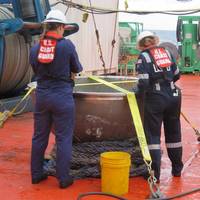
Authorities from the U.S., Canada and France are combing through evidence recovered from the Titan submersible that suffered a catastrophic implosion en route to the wreckage of the Titanic in June.Investigators from the U.S. Coast Guard, National Transportation Safety Board (NTSB), Transportation Safety Board of Canada (TSB) and the French Marine Casualty Investigation Authority (BEAmer) conducted an onsite evidence review in Newport, R.I., on November 8, as part of their respective…
Titan Submersible Debris and Human Remains Recovered from the Seafloor
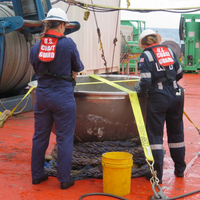
The U.S. Coast Guard on Tuesday said its engineers recovered remaining debris and presumed human remains from the imploded Titan submersible in the North Atlantic.The evidence recovered from the seafloor by marine safety engineers with the Coast Guard’s Marine Board of Investigation (MBI) was transferred to shore for analysis as part of ongoing investigations into the fatal incident.In June, the Titan imploded while on a voyage to visit the wreck site of the famed sunken ocean liner Titanic, killing all five people on board.
2018 Green Apple Spill Exercise
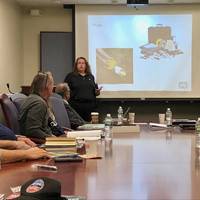
Committed to providing tugboat and towing vessel operators with a platform to meet regularity requirements and collaborate with local resources, the annual event also reminds us that Proper Planning Prevents Poor Performance.On September 28 2018, American Marine Associates, LLC (AMA) coordinated and hosted the 3rd annual Green Apple Spill Response Exercise in Bayonne, NJ. The Green Apple Spill Response exercise was established specifically for the tugboat and towing vessel industry operating in New York Harbor.
Poor Maintenance, Voyage Planning Led to Arca 1 Grounding
In its investigation report, the Transportation Safety Board of Canada (TSB) found that inadequate vessel maintenance and voyage planning guided by an underqualified crew led to the January 2017 grounding of the bunkering tanker Arca 1 near Sydney, Nova Scotia. There were no injuries to the six people on board and there was no pollution. On 8 January 2017, while being delivered to Mexico from Sorel, Quebec, the bunkering tanker Arca 1 went aground in Little Pond, Nova Scotia in heavy weather while under reduced propulsion due to a failure of the port propulsion clutch. The vessel sustained major damage to the hull and propulsion machinery. A few days later, the vessel was refloated and towed to Sydney.
MSC Monica Refloated
Panama-flagged container ship MSC Monica, which ran aground on the St. Lawrence River near Saint-Laurent, Quebec city, Canada on January 22, was refloated, according to the Transportation Safety Board of Canada (TSB). The 43,618 dwt container vessel was sailing from Montreal to St. Johns in Newfoundland. The Mediterranean Shippgng Co (MSC) company owned ship refloated on Saturday after deballasting 2,000 tons of water and with the assistance of three tugs of Ocean Group, came from Quebec. The Container ship is currently at the port of Quebec, where it will undergo several inspections. MSC Monica's body was learned that no damage and water ingress. The incident did not cause any disruption to marine traffic, and no pollution was spotted on the scene, the Canadian Coast Guard said.
TSB Team to Investigate Trois-Rivières Collision
The Transportation Safety Board of Canada (TSB) is deploying a team to Trois-Rivières, Quebec, following the collision between the bulk carrier Desert Rhapsody and the tug Ocean Basque. The TSB will gather information and assess the occurrence. The TSB is an independent agency that investigates marine, pipeline, railway and aviation transportation occurrences. Its sole aim is the advancement of transportation safety. It is not the function of the Board to assign fault or determine civil or criminal liability.
New Risks Moving Crude Oil by Rail
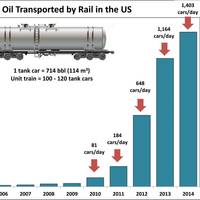
The rapidly changing landscape of crude oil exploration and drilling in the US and Canada, together with economic considerations, logistical issues related to pipeline transport, and the availability of new types of crude oils, including Bakken crude and various forms of bitumen, have resulted in a very sudden and dramatic increase in the transport of crude oil by railroad. “Unit trains” containing 100 or more tank cars are transporting crude oil through regions that have not previously experienced this type of rail transport, and there are significant concerns about safety.
TSB to Investigate Tug Incident in Fraser River
The Transportation Safety Board of Canada (TSB) is deploying a team of investigators following the girding and sinking of the tug Sea Imp X in the North Arm of the Fraser River, British Columbia. The occurrence took place yesterday at approximately 20:00 PDT. The TSB will gather information and assess the occurrence. It is publishing selected data pertaining to accidents and reportable incidents from its Marine Safety Information System (MARSIS) for use by professionals and the public to advance transportation safety. The TSB is an independent agency that investigates marine, pipeline, railway and aviation transportation occurrences. Its sole aim is the advancement of transportation safety. It is not the function of the Board to assign fault or determine civil or criminal liability.
TSB Investigating Ferry, Pleasure Craft Collision
The Transportation Safety Board of Canada (TSB) is deploying a team of investigators to Laval, Quebec, following a collision between the ferry Paule II and a pleasure craft which occurred on August 1. The TSB will gather information and assess the occurrences. The TSB is an independent agency that investigates marine, pipeline, railway and aviation transportation occurrences. Its sole aim is the advancement of transportation safety. It is not the function of the Board to assign fault or determine civil or criminal liability.
TSB to Investigate : MOL Precision Strikes Berth
Richmond, British Columbia, 11 May 2015 — The Transportation Safety Board of Canada (TSB) is deploying a team of investigators to Port Metro Vancouver, in British Columbia, where the container vessel MOL Precision struck the berth. The TSB will gather information and assess the occurrence. The TSB is an independent agency that investigates marine, pipeline, railway and aviation transportation occurrences. Its sole aim is the advancement of transportation safety. It is not the function of the Board to assign fault or determine civil or criminal liability.
Sinking of Five Star Highlights Fishing Vessel Safety
The Transportation Safety Board of Canada (TSB) released its investigation report (M14P0121) into the June 12, 2014, capsizing and sinking of the fishing vessel Five Star in Johnstone Strait, British Columbia. The Five Star was on its way back to Kelsey Bay, British Columbia, after a three-day crab-fishing voyage, with the master and one crew member aboard. The vessel was carrying approximately 1,250 kg of crabs in 22 holding cages stowed on the deck. While underway, approximately one third of the catch was transferred to a large empty tote positioned on the centerline of the deck and secured to port and starboard of the vessel. Later in the voyage, the vessel encountered increased winds and one-meter waves affecting the vessel on its stern quarters.
Maintenance Woes Led to Digby Ferry Grounding
Maintenance deficiencies and lack of adequate emergency procedures led to the November 7, 2013 loss of electrical power and grounding of the passenger ferry Princess of Acadia in Digby, Nova Scotia, the Transportation Safety Board of Canada (TSB) found in its report, M13M0287. The incident caused no injuries or pollution. According to TSB, Princess of Acadia was approaching the ferry terminal at Digby, Nova Scotia with 87 passengers and crew aboard. In preparation for docking, as the bow thruster was started, the main generator blacked out causing a loss of electrical power and disabling the main propeller pitch control pumps. Once the pitch control pumps stopped…
Tugboat Not Up to the Job: TSB Charlene Hunt Findings
Citing a lack of preparation, bad weather and a mechanical breakdown as three important factors, the TSB today released its investigation report (M13N0001) into the loss-of-tow by the tugboat 'Charlene Hunt' of the [passenger ship] 'MV Lyubov Orlova' in waters off the coast of Newfoundland and Labrador (NL). On 23, January 2013, bound for the Dominican Republic, the tug Charlene Hunt departed St. John's harbour towing the cruise ship Lyubov Orlova. The tug and tow travelled for approximately 19 hours, until they hit winds estimated at 40 knots and seas of 5 to 6 m. The heavy weather persisted and, at approximately 14:45 on 24 January, the towing arrangement between the tug and tow failed off Cape Race, NL.
Canada's TSB Reports on 'Bosun's Fatal Fall
On 08 May 2013, at 1455 Eastern Daylight Time, the dry bulk carrrier 'Federal Yoshino' was at anchor in Baie‑Comeau, Quebec when the crew member fell to the deck in a crane-hoisted provisioning basket from a height of about 5m when the hoisting cable parted, informs the Transportation Safety Board of Canada (TSB) in a recently released investigation report. The bulker was at anchor awaiting the arrival of a grain cargo when the accident occurred, and the crew was employed in general ship maintenance. At the time of occurrence, the bosun was working alone to chip rust aloft using a crane that was not suitable for lifting personnel. While the bosun was manoeuvring the crane, the crane block exceeded its set limit, but the limit switch was not activated and the electric motor kept operating.
Cargo Ship Aground in St Lawrence Seaway
The upbound freighter 'Sedna Desgagnes' aground near Johnstown Bridge off Prescott, Ontario. The casualty is completely out of the channel and appears to be in a shoal area with 6 m of water or less. The ship is hard aground with cargo on board. She is up at the bow a few feet and listing slightly to starboard. This will be a major salvage operation with lightering taking place before she is pulled off her strand, according to 'Daily Great Lakes & Seaway Shipping News'. The tug Ocean Georgie Bain was upbound and due to reach Iroquois Locks Sunday afternoon. Multiple tugs may be needed due to the close proximity of the bridge pilon and the very strong current which will take the Sedna towards it as soon as she is released from her strand. No pollution was reported.
TSB Release Findings on St. Lawrence Seaway Accident
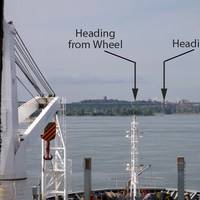
The Transportation Safety Board of Canada (TSB) issues its report on last year's St. In summary: on 31 March 2011 at 0309 Eastern Daylight Time, the downbound vessel BBC Steinhoeft, under the conduct of a pilot, ran aground in the South Shore Canal of the St. Lawrence Seaway downstream of St. Lambert Lock. Seaway traffic remained closed for 10 hours after the grounding until the vessel was refloated by 2 assisting tugs. There were no injuries or pollution as a result of this occurrence.
Sunken B.C. Ferry Crew Members Face Uncertainty
According to the AP, B.C. Ferries says it will suspend and possibly fire a handful of crew members who were working on the Queen of the North the night it sank if they don't take part into an investigation into the sinking. The report indicated that CEO David Hahn told Canadian Press that less than four crew members have refused to answer questions in the investigation. Hahn refused to say whether the crew members are critical to the investigation or include the two who were in the wheelhouse at the time of the crash. The ferry ran into Gil Island in Wright Sound and sank March 22nd. It carried 101 people and two people died. B.C. Ferry…
Tugboat Fire on Lake Ontario – Incident Classed as 'Major Marine Casualty'
USCG & Canadian safety agency begins investigation of tug fire. Chief engineer has now died in hospital. The U.S. Coast Guard and marine safety agencies from Canada have begun their investigations into the fire aboard the towing vessel Patrice McAllister near Prince Edward Point, Ontario. The most severely injured crewmember, the boat’s chief engineer, died in a Toronto hospital. The 105-foot U.S.-flagged vessel was transiting on Lake Ontario from Toledo, Ohio, to a port in New York when the fire broke out in the engine room. Another commercial towboat towed the Patrice McAllister to Clayton, N.Y. As the federal agency responsible for marine safety aboard commercial vessels…
Marine Accident Trend Downward in Canada
In all, 322 total marine accidents (Shipping accidents and Accidents aboard ship) were reported to the TSB in 2011, a 9% decrease from the 2010 total of 354 and a 23% decrease from the 2006–2010 average of 420. Twenty-two vessels were reported lost in 2011, down from the 2010 total of 27 and down from the five–year average of 31. Marine fatalities totaled 15 in 2011, down from the 2010 total of 18 and down from the five-year average of 19. Fatalities occurring during commercial fishing activity totaled 10 in 2011, unchanged from 2010, and down from the five–year average of 11. All fatalities involving fishing vessels totaled 12 in 2011, down from 11 in 2010, and down from the five–year average of 11.
New Practices Will Lead to Safer Passage in Arctic Waters

Highlighting the need for safer navigation in Canada’s Arctic, the Transportation Safety Board of Canada (TSB) released its report into the August 2010 grounding of the cruise ship, Clipper Adventurer in Coronation Gulf, Nunavut (M10H0006). "Our investigation determined there were problems with the vessel’s voyage planning but we also found that key safety information was not being proactively provided to vessels transiting the Arctic,” said TSB Investigator-in-Charge, Eric Asselin. “Traffic in these fragile waters is increasing.
TSB Canada Reassess Marine Safety Recommendations
Safety in Canada's marine sector has improved slightly, but complex and lengthy regulatory processes continue to hinder progress. Of the 19 outstanding marine recommendations assessed in 2012, two progressed to "fully satisfactory", two regressed and 13 remained unchanged. The remaining two recommendations were assessed for the first time in 2012. In 2000, the Board recommended that Transport Canada (TC) require small passenger vessels to provide pre–departure briefings, be equipped with deployable liferaft and accessible lifesaving equipment and have the means to immediately alert others during emergency situations (recommendation no. M01-03). Since then, TC has amended several regulations and shared safety guidance with small passenger vessel owners.
TSB Again Finds No Risk Management Caused Death
In its latest investigation report on Silver Angel (M11M0017), the Transportation Safety Board of Canada (TSB) has identified, once again, that the absence of a practical and active risk management system onboard a fishing vessel continues to result in loss of life. On the morning of 3 May 2011, at 5.5 nautical miles southwest of Cape Sable Island, Nova Scotia, a crew member from the small fishing vessel Silver Angel fell overboard while retrieving paravane stabilizers. The captain, the only other crew member onboard, made several unsuccessful attempts to rescue the crew member who was lost at sea. “"Our investigation found that the deckhand was not wearing safety equipment and this significantly reduced his chances of survival and rescue," said Pierre Murray, TSB Regional Manager.





